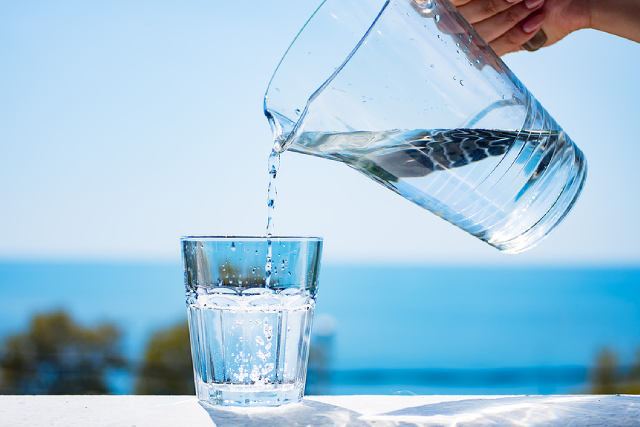
Amidst the busyness of everyday life, it’s easy to forget to drink enough water. But did you know that dehydration can sneak up on you, causing a myriad of health issues? By paying attention to your body’s signals, you can catch dehydration early and prevent its harmful effects.
Here are five common signs to watch out for:
1. Thirst
One of the most obvious signs of dehydration is thirst. When your body is lacking in fluids, it sends signals to your brain, prompting you to drink water. However, by the time you feel thirsty, you may already be mildly dehydrated.
That said, thirst is not always a reliable indicator of hydration status, especially in certain populations like older adults or children who may have a diminished thirst response. Therefore, it’s essential to be proactive about hydration rather than relying solely on thirst as a cue to drink water. Keep a water bottle within reach at all times, and sip on water consistently throughout the day to maintain optimal hydration levels.
2. Dark urine
The colour of your urine can be a helpful indicator of your hydration status. When you’re well-hydrated, your urine tends to be pale yellow or almost clear. On the other hand, if you’re dehydrated, your urine may become darker in colour, ranging from amber to brown. This change in colour occurs because your body is conserving water by producing less urine, resulting in a more concentrated waste product. So, pay attention to the colour of your urine – it can provide valuable insights into your hydration levels.
It’s important to note that certain medications, foods, and medical conditions can also affect the colour of your urine. For example, consuming beets or certain vitamins may cause your urine to appear pink or red, while some medications can turn it blue or green. However, if you notice consistently dark urine and are experiencing other symptoms of dehydration, such as thirst or fatigue, it’s crucial to prioritise rehydration. Aim to drink more water and monitor the colour of your urine to ensure that you’re adequately hydrating your body.
3. Fatigue
Did you know that hydration is important for quality sleep? Feeling tired or lethargic for no apparent reason could be a sign of dehydration. When you’re dehydrated, your body has to work harder to perform its functions, leading to feelings of fatigue and low energy, as well as impacting your ability to get restorative sleep. Dehydration can also impair cognitive function, making it difficult to concentrate and stay alert. If you find yourself struggling to stay awake or focused, try drinking a glass of water to see if it helps alleviate your symptoms.
4. Dry skin and lips
Your skin is the largest organ in your body, and it relies on adequate hydration to stay healthy and supple. When you’re dehydrated, your skin may become dry, tight, and less elastic. You may also notice that your lips feel dry and cracked. These changes occur because dehydration reduces the amount of moisture in your skin, leaving it vulnerable to damage and irritation. To keep your skin hydrated from the inside out, be sure to drink plenty of water and use moisturisers to lock in moisture.
5. Headaches
Dehydration can trigger headaches or exacerbate existing ones. When you’re dehydrated, your brain temporarily contracts, pulling away from the skull and causing pain. Dehydration also reduces blood flow to the brain, further contributing to headaches and migraines. If you frequently experience headaches, especially in the afternoon or after physical activity, dehydration could be a contributing factor. Drinking water and staying hydrated can help prevent and alleviate dehydration-related headaches.
Preventing dehydration
Now that you know the signs of dehydration, how can you prevent it? Below are some tips for staying hydrated and maintaining optimal health:
- Drink plenty of water: Aim to drink at least eight glasses of water per day or more if you’re active or live in a hot climate. Keep a reusable water bottle with you wherever you go to make it easier to stay hydrated throughout the day.
- Eat hydrating foods: Many vegetables and fruits have high water content and can contribute to your overall hydration. Incorporate foods like cucumbers, watermelon, oranges, and strawberries into your diet to increase your water intake.
- Limit dehydrating beverages: Beverages like coffee, tea, and alcohol can have diuretic effects, increasing your risk of dehydration. Limit your consumption of these beverages and balance them with plenty of water.
- Listen to your body: Pay attention to the signals your body sends you, including thirst, fatigue, and changes in urine colour. If you notice any signs of dehydration, take action immediately by drinking water and rehydrating.
- Stay hydrated during exercise: When you exercise, you lose water through sweat, so it’s essential to replenish lost fluids by drinking water before, during, and after physical activity.
- Have a water cooler at home: Investing in water coolers for home can make it more convenient and enjoyable to drink water throughout the day. With easy access to chilled, filtered water, you’ll be more likely to stay hydrated, especially during hot weather or busy days.
Conclusion
By staying vigilant and proactive about your hydration, you can prevent dehydration and its associated health risks. Remember, water is essential for every aspect of your health, so make hydration a priority in your daily routine!
With a wide range of options available for purchase, Watermaxx makes it easier than ever to access clean, refreshing water whenever you need it. Plus, if you’re in Singapore and looking for a convenient hydration solution, Watermaxx also offers water dispensers for rent. Whether you’re interested in purchasing a water cooler or looking to rent a water dispenser in Singapore, Watermaxx has you covered. Visit our website today to explore our products and find the perfect hydration solution for your home or office. Don’t wait until dehydration sneaks up on you – stay hydrated and healthy with Watermaxx.
